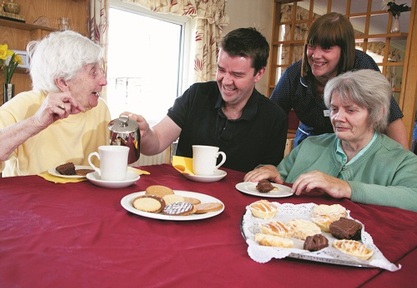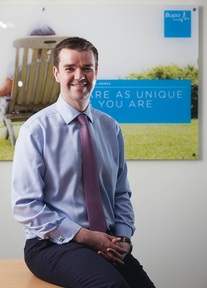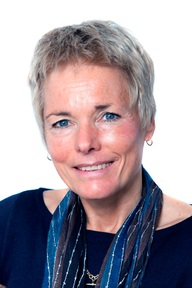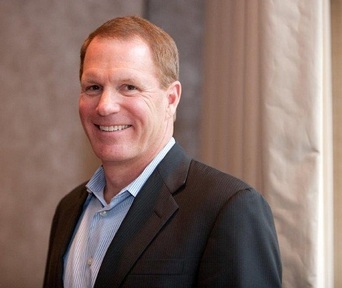Bupa boss calls on care sector to change people's perceptions of care homes
It is up to all of us in the sector to change people's perceptions of care homes, says Bupa Care Services’ managing director.

Care homes are finding it a struggle to shrug off the negativity that surrounds them, sparked by the likes of care home abuse cases such as Winterbourne View.
Earlier this year, the Alzheimer's Society's published its 'Low Expectations' report, revealing the poor image that care homes have. The study showed less than a third of the public believe people with dementia are well treated in care homes, and 70 per cent of adults said they would be “scared or fairly scared” at the prospect of relocating to a home themselves.
However one way of changing people’s perceptions, according to Andrew Cannon, is to “showcase the hard-work being done by committed and caring people in our homes each and every day. This is why we were a driving force behind National Care Home Open Day – this annual event is extremely important for me and the teams working in our homes”.
“I am determined that in the coming years we change perceptions of care homes and demonstrate that they are safe and happy places to live,” he adds.
Andrew Cannon, who is responsible for Bupa’s three hundred care homes, is part of a 27,000-strong team.
He took on this role last year. Prior to that, he was director of Healthcare Delivery and head of Customer Service at Bupa.
Care homes are an area he feels extremely passionate about as “like many people, I have seen close family members receive care. Because of this, I want to ensure that everyone living in our homes is happy and receiving the best possible standards of care.
“Caring for old and frail people is extremely important. I have spent a lot of time visiting and working in our care homes and I have absolute admiration for the patience, dedication and hard work that our people deliver.”
Training
Highly trained staff is of utmost importance, according to Mr Cannon.
“This is why we invest in training and developing our people to ensure they are fulfilled in their careers and love working at Bupa. I truly believe that having happier and more fulfilled employees helps our residents to live longer, healthier and happier lives too,” he says. “I am also a firm believer that everyone in our homes should receive training from our cooks and maintenance people to our carers and nurses. In 2013 we have invested over £12m in training and developing our people.
“We lead the sector on training and developing our people across a range of areas – ‘Person First, Dementia Second’ was specially designed for us by the world renowned Bradford University Dementia Care Centre. In fact, we were the first care home operator to be awarded the Gold Standard for excellence in staff development by Investors in People.”
Acquisition of Richmond Care Villages
In August, Bupa acquired Richmond Care Villages, which operates five luxury care villages in England - home to over 600 people. The deal also includes three further sites for developing new care villages.
The five villages – in Gloucester, Northamptonshire, Warwickshire, Cheshire, and Oxfordshire – include independent-living apartments and assisted-living support, along with residential care, all on one site. The acquisition is part of Bupa’s strategy, to offer older people a wider choice of care homes including luxury care villages – and give them that top of the range care option.

“Access to high-quality services and facilities, with the reassurance that further support is on hand if we need it, without having to move elsewhere. Care villages provide this all on one site.”
He believes the UK will begin to see more and more luxury care villages as older people want to keep their independence but still have access to good facilities and services.
Social care funding
However it is not all about luxury top of the range care homes at Bupa as 70 per cent of its residents are funded by local authorities and the whole issue of social care funding still needs to be urgently addressed by the Government, according to Mr Cannon.
“We know that care homes across the country are struggling with local council fee levels which have been cut by five per cent over the last three years and are well below the true cost of providing care for people who are older and have more complex conditions than ever before.”
He is concerned that the “risk is that long term this could mean closures within the sector, less choice and availability of care and more older people falling back into the NHS – and we’ve already seen the issues they’re facing this winter.”
The way social care funding is going, the gap between luxurious care homes for private funders and more basic care homes for those on local authority funded places looks set to become more and more defined. Mr Cannon says: “Everyone has the right to choice and to the highest quality of care regardless of who pays the bill.”
However he adds: “We always advise people to plan for care later in life to ensure they have the choice of where they receive their care. It is true though that we are facing a potential funding crisis. The sector’s challenge is to demonstrate and convince the government that we need local councils to pay fees that really do reflect the true costs of care.”
As for the future, Mr Cannon says: “We will continue to work hard to deliver top quality care to our residents and ensure we’re meeting future demand in a range of care settings. Bupa also “wants to provide more services in a more integrated way and further into the community.”
Interesting facts
What was your first job: Delivery boy for a local bakers
What is your favourite book: A Suitable Boy by Vikram Seth
What is your favourite film: The Godfather
What is your favourite piece of music: Too many to mention.
What is the best present you have ever received: My family
What was your last holiday: Turkey
Latest Profiles News
 05-Sep-16
Being chief executive of a care home provider is a 'huge responsibility and privilege'
05-Sep-16
Being chief executive of a care home provider is a 'huge responsibility and privilege'
 31-Mar-15
Profile: 'Both local and national Government needs to put its money where its mouth is,' says chair of the National Care Association
31-Mar-15
Profile: 'Both local and national Government needs to put its money where its mouth is,' says chair of the National Care Association
 16-Dec-14
Profile: Care home turnaround specialist reveals some of the tricks of the trade
16-Dec-14
Profile: Care home turnaround specialist reveals some of the tricks of the trade
 01-Dec-14
Profile: ‘People should not be dreading going into a care home – they should be looking forward to it,’ says care home boss
01-Dec-14
Profile: ‘People should not be dreading going into a care home – they should be looking forward to it,’ says care home boss
 07-Oct-14
Exercise is key to 'changing the care sector' says provider of exercise therapy in care homes
07-Oct-14
Exercise is key to 'changing the care sector' says provider of exercise therapy in care homes